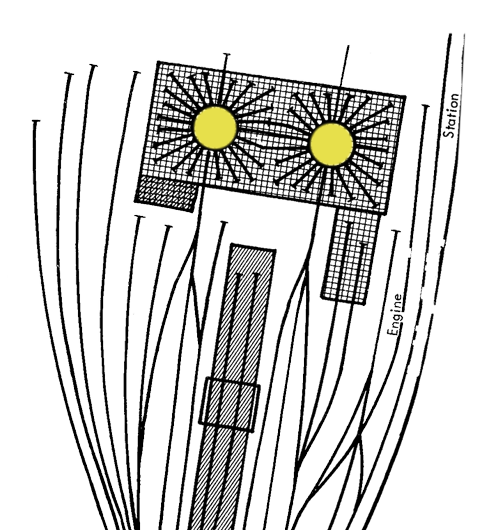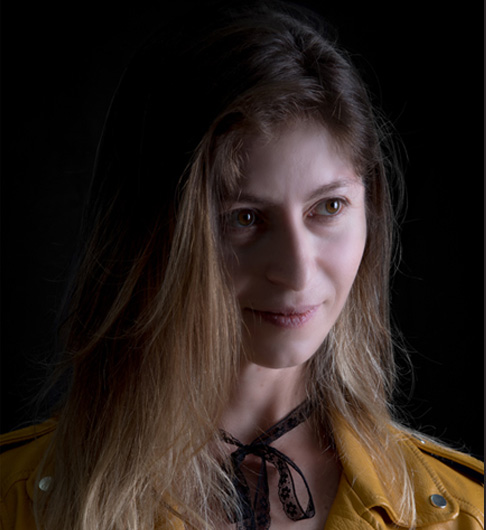ARTIST STATEMENT
ARTIST STATEMENT
Art may be entertaining,
but entertainment is not art.
I write music, so that when we meet, you and I,
we are not strangers anymore.
Sharing common music is deeper than words.
I write music, and so I am never too lonely,
or too bored – the music accompanies
and connects to the outer world,
keeps challenging me day by day.
Music for me has ever changing languages,
colors, borders, laws, victories, jokes, adventures.
Music can only heal, it never kills.
Welcome to my journey.


Art may be entertaining,
but entertainment is not art.
I write music, so that when we meet, you and I,
we are not strangers anymore.
Sharing common music is deeper than words.
I write music, and so I am never too lonely,
or too bored – the music accompanies
and connects to the outer world,
keeps challenging me day by day.
Music for me has ever changing languages,
colors, borders, laws, victories, jokes, adventures.
Music can only heal, it never kills.
Welcome to my journey.
BIO
Aviya Kopelman is a leading Israeli composer, born in Moscow, raised in Jerusalem and living in Tel-Aviv. Since 2014 she serves as the Composer-in-Residence of the Jerusalem Symphony Orchestra. Right upon her graduation recital, Aviya grabbed the attention of all of Israel’s major newspapers, that described her music as “distinct, radical, pure, expressive, dramatic, and personal.”
One of the youngest ever recipients of the Israeli Prime Minister’s Prize for Composition (2007), Kopelman is also the winner of the “Kronos: Under 30 Project”, in which she was exclusively chosen to write a work commissioned and performed by the Kronos Quartet (co-commissioned with Carnegie Hall, NY) out of more than 300 competitors from across the world. The work has been performed in major venues around the world and recorded for a CD. This major piece for string quartet has been only natural development after Kopelman’s first critically acclaimed work – her early String Quartet no.1, written as early as in 2000. She remained dedicated to string quartet writing, writing another substantial work “Hidden Place”, which was premiered and further performed by the Cremona Quartet.
Kopelman returned twice more to Carnegie Hall. First, as a composer and piano performer in another work commissioned by CH for singers and ensemble, and once again as part of the Professional Training Workshop with the Kronos Quartet.
From the very beginning of her musical journey, Kopelman’s attention was focused on identity issues. Her works during the years addressed the subject from personal, social, national, historical, gender, aesthetic, and other perspectives, looking for the universal approach even in local and personal matters.
Among her pieces are works dealing with the memory of the Holocaust, with the Jewish theological-philosophical idea of free will and God’s presence in our lives, and with the silence of the world during the WWII Jewish Holocaust and with how the climate of nationalism creates a general lack of empathy for humanity.
One of her earlier works “May They Rest in Peace” is dedicated to the victims of the terror of the 2nd Intifada, when another one – “Between Gaza and Berlin” – was written during the “Protective Edge” military operation in 2014, referring to both the complicated political situation and to the cultural situation in Israel, which often seems to be stuck between Western ambition and Middle-Eastern reality. Less charged works dealing with the same situation include a concerto for oud and violin, pointing at the special musical culture that is being created in Israel and in the Middle East nowadays, the culture that has a lot in common with the Baroque Concerto Grosso, as well as the symphonic overture “Ode to Jerusalem.” She has set music for many Jewish texts, from Biblical verses on various subjects relevant to our time to modern Jewish and Israeli poetry.
Another important theme for Kopelman is feminism. As a woman in a highly male-dominated profession (and world…), Kopelman feels increasingly more connected to feminist issues and obliged to raise awareness and provoke thought on women-related subjects. One example is the Hebrew Magnificat, a piece for choir and orchestra that builds a Feminist-Jewish parallel to the common Magnificat, using Latin, German and Hebrew texts and chants, focusing on various aspects of maternity.
Other works address the role and identity of an artist, especially a female, in society – always struggling, too often tragic. Kopelman leaned on the poetry of Anna Achmatova, Lea Goldberg, Yona Wallach, Emily Dickinson and her texts for her musical works such as “Songs of Love & Distress” for voice and piano/string quartet, “Sooner and Later” for voice and string orchestra, percussion and drums, and “Grief Measure” song cycle.

In her commissioned work for the Kronos Quartet, “Widows and Lovers,” Kopelman continued to experiment with the combination of live and pre-recorded electronics with acoustic instruments, an exploration started previously in a cello solo work commissioned by the award-winning cellist Gavriel Lipkind. The cello piece was later performed by Kronos Quartet violist Hank Dutt. Another experimental work is “Anarchy if a Synagogue” for violin and Max/MSP live electronics.
Throughout her career, Kopelman has been searching for her most truthful, accurate and up-to-date musical path, always remaining curious for new musical universes and languages. One of Kopelman’s hallmarks today is her multi-genre work that combines her diverse musical passions. Some of her concerts work intentionally blur the line between concert and non-concert music, being equally suitable for performance in various venues and for varied audiences. These may include works such as “Sooner and Later,” “Grief Measure,” Belong Not” (commissioned by the San Francisco Girls Chorus), “Black Widow” (third movement of “Widows & Lovers,” often performed as an independent piece) and “Be Humble” for mixed choir on a text from Tao Te Ching. Other works deliberately have been written for non-concert ensembles. Some examples of the latter include forming a Jazz-Fusion ensemble, recording an album of her songs, combining contemporary instrumental writing with alternative art-Rock and cooperating with many non-classical musicians.
While the composition is the core of her artistic career, Kopelman has also been teaching from a very early stage and sees it as a vocation. She has more than 13 years of postgraduate teaching experience, working in leading institutions such as Rimon School of Music and Hed College, as well as continuously guest lecturing in Israeli high-education institutions and giving workshops and courses for youths.
Holding an MA Summa Cum Laude in composition, Kopelman is a Presidential Scholarship Ph.D. student at Bar-Ilan University, Israel. She was a recipient of the Israel Institute Visiting Artists Program, as well as the Cite des Arts Paris residency.

Aviya Kopelman is a leading Israeli composer, born in Moscow, raised in Jerusalem and living in Tel-Aviv. Since 2014 she serves as the Composer-in-Residence of the Jerusalem Symphony Orchestra. Right upon her graduation recital, Aviya grabbed the attention of all of Israel’s major newspapers, that described her music as “distinct, radical, pure, expressive, dramatic, and personal”.
One of the youngest ever recipients of the Israeli Prime Minister’s Prize for Composition (2007), Kopelman is also the winner of the “Kronos: Under 30 Project”, in which she was exclusively chosen to write a work commissioned and performed by the Kronos Quartet (co-commissioned with Carnegie Hall, NY) out of more than 300 competitors from across the world. The work has been performed in major venues around the world and recorded for a CD. This major piece for string quartet has been only natural development after Kopelman’s first critically acclaimed work – her early String Quartet no.1, written as early as in 2000. She remained dedicated to string quartet writing, writing another substantial work “Hidden Place,” which was premiered and further performed by the Cremona Quartet.
Kopelman returned twice more to Carnegie Hall. First as a composer and piano performer in another work commissioned by CH for singers and ensemble, and once again as part of the Professional Training Workshop with the Kronos Quartet.
From the very beginning of her musical journey, Kopelman’s attention was focused on identity issues. Her works during the years addressed the subject from personal, social, national, historical, gender, aesthetic, and other perspectives, looking for the universal approach even in local and personal matters.
Among her pieces are works dealing with the memory of the Holocaust, with the Jewish theological-philosophical idea of free will and God’s presence in our lives, and with the silence of the world during the WWII Jewish Holocaust and with how the climate of nationalism creates a general lack of empathy for humanity.
One of her earlier works “May They Rest in Peace” is dedicated to the victims of the terror of the 2nd Intifada, when another one – “Between Gaza and Berlin” – was written during the “Protective Edge” military operation in 2014, referring to both the complicated political situation and to the cultural situation in Israel, which often seems to be stuck between Western ambition and Middle-Eastern reality. Less charged works dealing with the same situation include a concerto for oud and violin, pointing at the special musical culture that is being created in Israel and in the Middle East nowadays, the culture that has a lot in common with the Baroque Concerto Grosso, as well as the symphonic overture “Ode to Jerusalem.” She has set music for many Jewish texts, from Biblical verses on various subjects relevant to our time to modern Jewish and Israeli poetry.
Another important theme for Kopelman is feminism. As a woman in a highly male-dominated profession (and world…), Kopelman feels increasingly more connected to feminist issues and obliged to raise awareness and provoke thought on women-related subjects. One example is the Hebrew Magnificat, a piece for choir and orchestra that builds a Feminist-Jewish parallel to the common Magnificat, using Latin, German and Hebrew texts and chants, focusing on various aspects of maternity.
Other works address the role and identity of an artist, especially a female, in society – always struggling, too often tragic. Kopelman leaned on the poetry of Anna Achmatova, Lea Goldberg, Yona Wallach, Emily Dickinson and her texts for her musical works such as “Songs of Love & Distress” for voice and piano/string quartet, “Sooner and Later” for voice and string orchestra, percussion and drums, and “Grief Measure” song cycle.
In her commissioned work for the Kronos Quartet, “Widows and Lovers,” Kopelman continued to experiment with the combination of live and pre-recorded electronics with acoustic instruments, an exploration started previously in a cello solo work commissioned by the award-winning cellist Gavriel Lipkind. The cello piece was later performed by Kronos Quartet violist Hank Dutt. Another experimental work is “Anarchy if a Synagogue” for violin and Max/MSP live electronics.
Throughout her career, Kopelman has been searching for her most truthful, accurate and up-to-date musical path, always remaining curious for new musical universes and languages. One of Kopelman’s hallmarks today is her multi-genre work that combines her diverse musical passions. Some of her concerts work intentionally blur the line between concert and non-concert music, being equally suitable for performance in various venues and for varied audiences. These may include works such as “Sooner and Later,” “Grief Measure,” Belong Not” (commissioned by the San Francisco Girls Chorus), “Black Widow” (third movement of “Widows & Lovers,” often performed as an independent piece) and “Be Humble” for mixed choir on a text from Tao Te Ching. Other works deliberately have been written for non-concert ensembles. Some examples of the latter include forming a Jazz-Fusion ensemble, recording an album of her songs, combining contemporary instrumental writing with alternative art-Rock and cooperating with many non-classical musicians.
While the composition is the core of her artistic career, Kopelman has also been teaching from a very early stage and sees it as a vocation. She has more than 13 years of postgraduate teaching experience, working in leading institutions such as Rimon School of Music and Hed College, as well as continuously guest lecturing in Israeli high-education institutions and giving workshops and courses for youths.
Holding an MA Summa Cum Laude in composition, Kopelman is a Presidential Scholarship Ph.D. student at Bar-Ilan University, Israel. She was a recipient of the Israel Institute Visiting Artists Program, as well as the Cite des Arts Paris residency.

